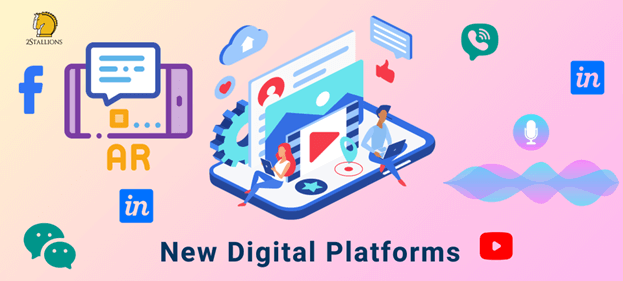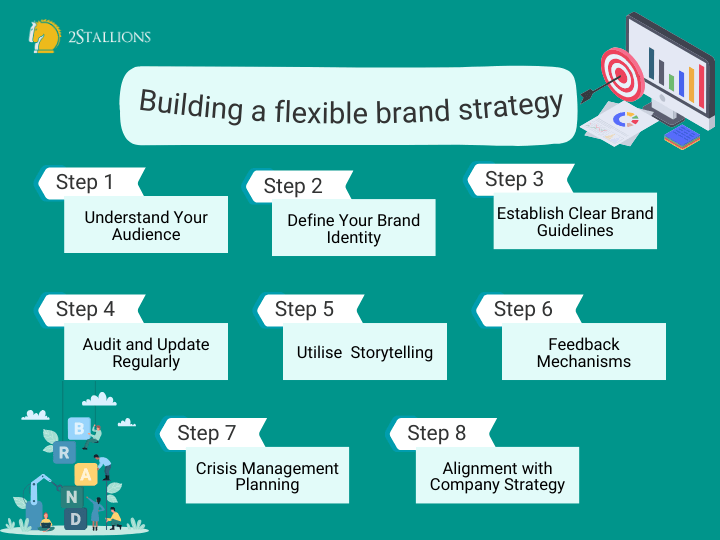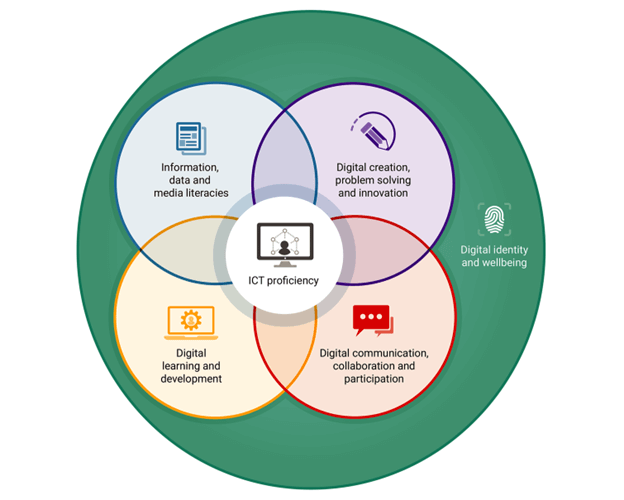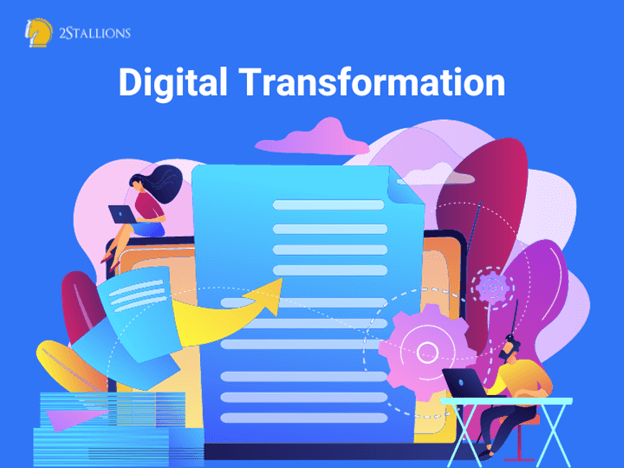Content
SHARE

As we approach 2025, it’s time to start thinking about how you can position your brand for success in the digital realm. This article serves as your guiding compass, navigating through essential factors and delineating the necessary steps to prepare your brand for the dynamic landscape, addressing both challenges and opportunities that await in the future.
Understanding the Evolving Digital Landscape
The first step towards preparing your brand for the future is gaining a deep understanding of the digital landscape that is constantly evolving. From the rise of new digital platforms to the importance of data in digital marketing, there are several trends and changes to be aware of.This encompasses recognizing key trends and changes, ranging from the ascent of novel digital platforms to the pivotal role played by data in the realm of digital marketing.
As we enter 2025, new platforms continue to emerge, giving brands new opportunities to connect with their target audiences. However, with more and more new platforms emerging, brands are left confused about how to use them.
In this chapter, we will explore the new brands’ platform and their advantages shedding light on strategic approaches for brands navigating the evolving digital terrain.
The Rise Of New Digital Platforms
As we approach 2025, a wave of new platforms is surfacing, offering brands novel avenues to connect with their target audience. One notable entrant in this landscape is augmented reality (AR), enabling brands to craft immersive customer experiences that blur the boundaries between the physical and digital realms. These experiences not only elevate customer engagement but also serve as catalysts for increased sales and brand loyalty.
Another emerging platform is voice assistants, such as Amazon’s Alexa and Apple’s Siri. Voice search is becoming increasingly popular, with more and more people using voice commands to search for information or make purchases.
Brands that optimise their content for voice search will have a competitive advantage in reaching their target audience and driving conversions. Ensuring a dynamic and effective approach to audience engagement as we venture into the digital landscape of 2025.
The Importance Of Data In Digital Marketing
Data has become the lifeblood of digital marketing. It enables brands to understand their audience better, personalise their messaging, and make data-driven decisions.
One area where data plays a significant role is in personalisation. By analysing customer data, brands can create personalised experiences that resonate with their target audience.
Whether tailoring product recommendations based on past purchases or sending personalised emails, brands leveraging data to deliver personalised experiences will stand out from the competition.
This chapter will describe how artificial intelligence (AI) has become an important factor for brands. With the advancement of digitalisation, many brands have begun to use artificial intelligence (AI) to change the digital landscape. Brands need to use AI to interact with their audiences.
The Role Of Artificial Intelligence In The Digital Landscape
Meaning of Artificial Intelligence
Artificial intelligence (AI) is revolutionising the digital landscape and transforming how brands interact with their audience.One area where AI is making a significant impact is in customer service. Chatbots, powered by AI, can handle customer queries and provide instant support, freeing up human resources for more complex tasks. This improves customer satisfaction, reduces response times, and increases efficiency.
Another application of AI is in content recommendations. By analysing user behaviour and preferences, AI algorithms can suggest relevant content to users, increasing engagement and driving conversions.
Adapting Your Brand For The Future
Once you understand the evolving digital landscape, it’s time to adapt your brand to meet future demands. Here are a few key areas to focus on:
Embracing Digital Transformation
Imagine reaching your target audience anytime, anywhere, and on any device. With digital technologies, you can create personalised experiences that resonate with your customers, ultimately driving brand loyalty and revenue growth.
Furthermore, digital transformation allows you to streamline your operations and improve efficiency. By automating manual processes and harnessing the power of data analytics, you can make informed business decisions and optimise your resources. This saves time and money and enables you to focus on what truly matters: The ultimate focus becomes delivering substantial value to customers.
This chapter will describe how to become a flexible eight brand strategy. Mastering a flexible brand strategy can quickly respond to market changes and consumer needs. The progress of the times requires different changes in the brand to achieve success, provide insights into cultivating adaptability brand strategy to align with the demands of the times.
Building A Flexible Brand Strategy
A rigid brand strategy may hinder your ability to adapt quickly and seize emerging opportunities. Instead, focus on building a flexible brand strategy that allows for agility and experimentation. Be open to iterating on your marketing campaigns, exploring new platforms, and adjusting your messaging based on real-time data and customer feedback.
A flexible brand strategy enables swift responses to market changes and consumer demands. It allows for continuously testing new ideas, learning from failures, and refining one’s approach.Remember, in the digital age, standing still is not an option. It’s all about staying agile and embracing change.
This chapter will talk about prioritising digital skills for success. Brands can invest in developing their teams’ digital expertise, ranging from data analysis to content creation. Consider partnering with external experts or agencies to enhance innovation and stay ahead in the digital space.
Source: The University of Tasmania Digital Capabilities Framework
Investing In Digital Skills And Capabilities
Invest in developing a team with the necessary digital skills, from data analysis to content creation. Additionally, consider partnering with external digital experts or agencies to complementarily, explore the option of collaborating with external digital experts or agencies to augment your team’s proficiency and remain on the cutting edge of digital innovation.
Furthermore, collaborating with external digital experts can bring fresh perspectives and insights to your brand. These experts have a deep understanding of the digital landscape. They can provide valuable guidance on emerging technologies, best practices, and innovative strategies. This collaborative approach ensures that your brand remains adaptive and well-informed in navigating the dynamic and ever-evolving digital realm.
2Stallions transformed an outdated website into a mobile-friendly platform. 2Stallions comprehensive process involves exploring your vision, understanding your business needs, implementing solutions with defined goals and stakeholder involvement, advising on strategies aligned with your objectives and target audience, analysing performance through continuous monitoring and testing, and optimising based on opportunities uncovered during analysis.
Navigating the Challenges of the Digital Landscape
While the digital landscape offers immense opportunities, it has its fair share of challenges. Here are a few challenges that your brand may encounter as we head into 2025:
Dealing With Data Privacy And Security Issues
As technology advances and more data is collected, the risk of data breaches and privacy violations increases. Brands need to stay up-to-date with the latest regulations and best practices in data protection.
By implementing robust security measures and being transparent about data usage, brands can establish trust with their audience and demonstrate their commitment to protecting their customers’ information.
Overcoming Digital Fatigue
As consumers become digitally savvy, they are also becoming more selective about the content they engage with. Digital fatigue is a real challenge for brands, as attention spans are shrinking, and competition for attention is fierce. To overcome digital fatigue, create quality, relevant content that adds value to your audience’s lives. Personalise your messaging to cut through the noise and establish meaningful connections.
Managing the Pace of Digital Change
The speed of digital change can be overwhelming, and staying ahead of the curve can feel like an uphill battle. However, resisting the temptation to chase every new trend is important. Instead, focus on understanding your audience and their needs. Evaluate emerging technologies and platforms based on how they align with your brand’s objectives and target audience. Prioritise quality over quantity and make informed decisions about which changes to embrace.
In this chapter, we’ll explore the Opportunities Of The Digital Landscape. In this chapter, we’ll tell you how to create compelling content and work with influencers who align with your values, which digital methods you can use to attract customers, and how to create compelling content in 2025 to become an innovative brand.
Seizing The Opportunities Of The Digital Landscape
While the challenges can be daunting, significant opportunities are also waiting to be seized. Here’s how your brand can make the most of the digital landscape in 2025:
Leveraging Digital Tools For Brand Visibility
Consider creating informative blog posts, captivating videos, and interactive infographics that provide valuable insights and solutions to your audience’s pain points. Additionally, collaborating with influencers can significantly amplify your brand’s visibility. Identify influencers who align with your brand values and have a substantial following in your target market. You can access their loyal audience and expand your brand’s reach by partnering with them for sponsored content or brand collaborations.
Engaging With Customers In The Digital Space
Use the various digital touchpoints to interact with your audience and build meaningful connections. Social media platforms offer an excellent opportunity to engage with your customers personally. Respond promptly to comments and messages, showing that you value their feedback and are committed to providing excellent customer service.
Email marketing is another powerful tool for customer engagement. Segment your email list based on customer preferences and behaviours, and tailor your messages accordingly.
Personalised emails that offer relevant content, exclusive offers, or personalised recommendations can significantly enhance customer loyalty and drive repeat purchases.
Innovating for the digital future
To excel in 2025 and beyond, prioritise innovation in your brand’s digital strategy. Explore new technologies like AR and VR for immersive customer experiences. Optimise voice search to capture a growing audience using conversational content and relevant keywords. Position your brand for success by understanding the evolving digital landscape, adapting for the future, and staying proactive. Invest in the right skills and technologies to lead the digital revolution and stay ahead. Brands must position themselves for success in navigating the swiftly evolving digital terrain.
By comprehending the changing digital landscape, adapting your brand for the future, surmounting challenges, and seizing opportunities, you can ready your brand for 2025 and beyond. Embrace the digital revolution, invest in the right skills and technologies, and consistently stay ahead.
Frequently Asked Questions About Digital Landscape
What Is The Digital Advertising Landscape?
There are many types of ads, including display, video, audio, sponsored, native, social media and search. Consumer data and the ad tech acting on that data are ubiquitous and complicated.
What Are The 4 Aspects Of The Digital Marketing Landscape?
The four key aspects of the digital marketing landscape are:
- Search Engine Optimisation (SEO): Optimising websites to rank higher on search engines.
- Social Media Marketing (SMM): Using platforms like Facebook and Instagram for promotion and engagement.
- Content Marketing: Creating and distributing valuable content to attract and retain an audience.
- Email Marketing: Sending targeted messages through email for lead nurturing and customer engagement.
What Are The 5 Keys Of Digital Marketing?
- Mobile Considerations,
- Organic Search,
- Social Media Marketing,
- Content Marketing
- Lead Nurturing.
How Is The Digital Landscape Evolving?
Artificial Intelligence (AI) and Machine Learning (ML) technologies are at the forefront of digital transformation, offering innovative solutions to optimise various business operations.
What Is Successful Digital Transformation?
It means being efficient, rapid, and adaptable to stay ahead of the pack using design and technology as enablers. All processes, systems, and organisational structures that act against such intentions will play a huge part in why some digital transformation initiatives fail.

















